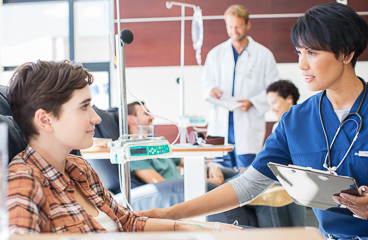
Your Care Instructions
Cancer is often treated with medicines that destroy the cancer cells (chemotherapy). These medicines may slow cancer growth and prevent or stop the spread of cancer. Chemotherapy also can affect healthy cells and cause side effects.
Most people can work and do their normal activities after and even during chemotherapy, but they may need to limit their schedules. Side effects of chemotherapy may include nausea and vomiting, loss of appetite, pain, and being tired. Some medicines can cause diarrhea or mouth sores. Your doctor may prescribe medicines to treat the side effects. Your doctor will advise you to take extra care to prevent illnesses and infections, because chemotherapy weakens your natural defenses.
Follow-up care is a key part of your treatment and safety. Be sure to make and go to all appointments, and call your doctor if you are having problems. It's also a good idea to know your test results and keep a list of the medicines you take.
How can you care for yourself at home?
Nausea and vomiting
- After vomiting has stopped for 1 hour, sip a rehydration drink, such as Pedialyte.
- Drink plenty of fluids to prevent dehydration. Choose water and other clear liquids until you feel better.
- When you are feeling better, eat small amounts of food.
Loss of appetite
- Try to eat food that has protein and extra calories to keep up your strength and prevent weight loss.
- When you feel like eating, start with small amounts of food.
Pain control
- If your doctor prescribes medicines to control pain, take them as directed.
- Try using relaxation exercises to lower your anxiety and stress, which can increase pain.
- Keep track of your pain so you can tell your doctor what your pain is like. Write down where you feel pain, how long it lasts, what seems to bring it on, and how it feels. Also note what makes the pain feel better or worse.
Mouth sores
- Make a rinse to keep your mouth from getting dry. Add 1 teaspoon baking soda and ½ teaspoon salt to a quart of water. Use it to rinse your mouth 4 to 6 times each day.
- When you feel like eating, start with small amounts of soft food.
- Drinking through a straw may help with pain.
Diarrhea
- Before you take any type of over-the-counter medicine, tell your doctor that you are having diarrhea.
- Drink plenty of room-temperature fluids to prevent dehydration. Take frequent sips of water and other clear liquids until you feel better.
- Eat small meals often throughout the day instead of three big meals.
Weakness and feeling tired
- Try to get some exercise, such as walking, but stop if you are too tired.
- Do something you enjoy. Do you like to listen to music? Spend some time listening to your favorite music. Or find another way to relax by reading, watching a movie, or playing games.
- Ask family and friends to help with home chores and other tasks.
To prevent infections
- Wash your hands often during the day, especially before you eat and after you use the bathroom.
- Stay away from people who have illnesses that you might catch, such as the flu or a cold.
- Try to stay out of crowds.
Hair loss
- Use a mild shampoo and a soft hair brush.
- Use sunscreen and a hat, scarf, or turban to protect your scalp from the sun.
- Ask your doctor about other treatments that you may try to prevent or minimize hair loss. These may include the use of a cooling cap.
When should you call for help?
Call 911 anytime you think you may need emergency care. For example, call if:
- You passed out (lost consciousness).
Call your doctor now or seek immediate medical care if:
- You have a fever.
- You have abnormal bleeding.
- You have new or worse pain.
- You think you have an infection.
- You have new symptoms, such as a cough, belly pain, vomiting, diarrhea, or a rash.
Watch closely for changes in your health, and be sure to contact your doctor if:
- You are much more tired than usual.
- You have swollen glands in your armpits, groin, or neck.
- You do not get better as expected.
Where can you learn more?
Go to http://www.healthwise.net/patientEd
Enter B484 in the search box to learn more about "Managing Side Effects of Chemotherapy: Care Instructions".
Current as of: October 19, 2024
Author: Ignite Healthwise, LLC Staff
Clinical Review Board
All Ignite Healthwise, LLC education is reviewed by a team that includes physicians, nurses, advanced practitioners, registered dieticians, and other healthcare professionals.

